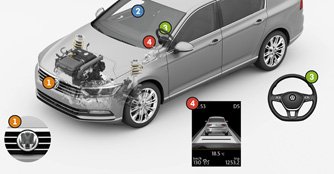Volkswagen's braking system reduces third-party injury claims
23 May 2015|3,700 views
The Volkswagen Golf and Passat models have been praised by vehicle safety experts at the Thatcham Research Centre, who have seen a 45 percent drop in third-party personal injury insurance claims thanks to the fitment of auto-emergency braking systems.

Matthew Avery, Director of Safety at Thatcham Research, said, "These findings are based on the equivalent of more than 7,000 Mk VII Golf models insured for a full 12 months on the road, and come from claims data from our insurance members."
Although such systems are not new, it was the Golf that 'democratised safety' and brought ACC to a wide audience. The system operates over a speed range from 30km/h to 160km/h with a manual gearbox and with DSG.
In vehicles with DSG, it can intervene to such an extent that the car may be slowed to a complete standstill. In normal driving ACC maintains a preselected speed and a defined distance to the vehicle ahead, and it automatically brakes or accelerates in flowing traffic.
Front Assist continually monitors the distance to the traffic ahead and assists the driver in critical situations by preconditioning the brake system and alerting the driver to any required reactions by means of visual and audible warnings. Should the driver not react at all, Front Assist automatically slows the car so that the speed of any impact is minimised. The system also assists the driver by an alert if the car is getting too close to the vehicle in front. The city emergency braking function is also part of Front Assist and operates at speeds below 30km/h .
The Volkswagen Golf and Passat models have been praised by vehicle safety experts at the Thatcham Research Centre, who have seen a 45 percent drop in third-party personal injury insurance claims thanks to the fitment of auto-emergency braking systems.
The latest generation Golf except for the entry-level S models have Adaptive Cruise Control (ACC) as standard, including the radar sensor controlled distance monitoring system Front Assist, as well as city emergency braking and cruise control. Since launch, third-party injury claims on the latest Golf are 45 percent lower than for the equivalent 'Small Family Car Control Group'.
Matthew Avery, Director of Safety at Thatcham Research, said, "These findings are based on the equivalent of more than 7,000 Mk VII Golf models insured for a full 12 months on the road, and come from claims data from our insurance members."
Although such systems are not new, it was the Golf that 'democratised safety' and brought ACC to a wide audience. The system operates over a speed range from 30km/h to 160km/h with a manual gearbox and with DSG.
In vehicles with DSG, it can intervene to such an extent that the car may be slowed to a complete standstill. In normal driving ACC maintains a preselected speed and a defined distance to the vehicle ahead, and it automatically brakes or accelerates in flowing traffic.
Front Assist continually monitors the distance to the traffic ahead and assists the driver in critical situations by preconditioning the brake system and alerting the driver to any required reactions by means of visual and audible warnings. Should the driver not react at all, Front Assist automatically slows the car so that the speed of any impact is minimised. The system also assists the driver by an alert if the car is getting too close to the vehicle in front. The city emergency braking function is also part of Front Assist and operates at speeds below 30km/h .
Latest COE Prices
April 2025 | 1st BIDDING
NEXT TENDER: 23 Apr 2025
CAT A$97,724
CAT B$117,899
CAT C$68,782
CAT E$117,002
View Full Results Thank You For Your Subscription.


















